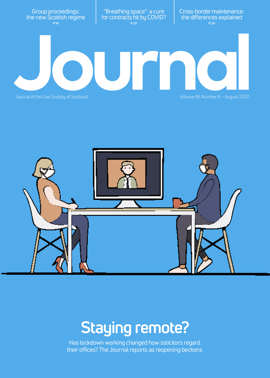Letters: August 2020
I recently completed my Diploma after five years as a mature student, beginning when I was 47. I had never really considered subconscious age discrimination, though as a gay male secretary when starting my career in the late 1980s, discrimination was not new to me. In fact, I experienced the spectrum of discrimination in the office environment, not only against myself but due to race, sex, sexuality and disability to name but a few.
Over the years there has been considerable progress, including legislation and increased awareness of these issues. There also appears to be more awareness in the public mind of age discrimination against mature people in the workplace. This does not mean, of course, that there is not still considerable work needed in all areas to eliminate discrimination: witness the recent racial discrimination that still features daily in the headlines.
With this in mind, I have felt it necessary to raise an issue on several occasions with both my universities regarding statements that are quite common but as to which there appears to be a lack of understanding of the impact they have on mature students. The comments are quite innocent and run off the tongue easily, but I suggest that, just like other comments about sexuality, race, sex etc, they no longer have a place in modern society.
You are now wondering what on earth these could be. Surely you have never made them? Well, you might be surprised. The first instance I experienced was when a senior lecturer was discussing what the legal profession was looking for in its graduates. The phrase “what firms are looking for in their young lawyers…” took me by surprise, as I was sitting near the front and whilst I was the oldest, there were certainly other students in their 30s and 40s. Such statements have been quite common over the years and I have made it a point of raising it privately with the lecturer, or guest speaker, to make them aware of how disappointing this can be to a mature student.
On another occasion a speaker said they had thought about rejoining a firm in their late 30s or early 40s after teaching, but had decided they were “past it”. Again, not only I but others in the class felt excluded by this and wondered whether it was worth all the effort studying if this was the reality. I, and other mature students I have met, have considerable drive and ambition to undertake university studies later in life and it should be appreciated how these off the cuff remarks can come across.
I write this in the hope that, just as you would not now make references to sex or race, references to age are considered and adjusted. Robert Neil Butler as early as 1969 coined the phrase “ageism” and considered that it could be either “casual or systematic”. The above statements fall squarely under the “casual” element.
An article I recently read referred at one point to “young lawyers”, but also later to “newly graduated” and “newly qualified”. So, when you are going to use the word “young” to refer to a group of people who may not, actually, all be “young”, please consider the implications and use a different expression.
A proud mature student
Regulars
Perspectives
Features
Briefings
- Criminal court briefing: Coronapocalypse?
- Employment: Unfairly anonymous?
- Family: When experts miss the mark
- Human rights: Judicial review refusal does not need oral hearing
- Pensions: Members' benefits: compensation and protection action
- Scottish Solicitors' Discipline Tribunal
- Property: Code to recovery
- In-house: “So, how are you?”






